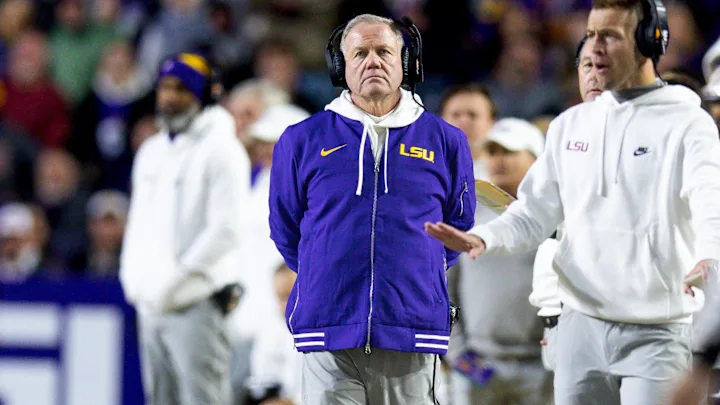Should LSU football follow the USC Trojans and Texas Longhorns in canceling their spring games?

The annual spring football game is a significant tradition in college football, serving as an exhibition of talent, team development, and fan engagement before the start of the regular season. These games are typically held at the conclusion of spring practices and provide an opportunity for coaches to evaluate their roster, test new strategies, and give fans a chance to see their teams in action. However, as college football continues to evolve, some teams, including the USC Trojans and Texas Longhorns, have opted to cancel their spring games in recent years for a variety of reasons.
In this context, the question arises: Should LSU Football consider following suit and canceling its spring game? While LSU has a long-standing tradition of holding a spring game, the decision to cancel it or adjust its format could have significant implications for the program. In this article, we will explore the rationale behind USC and Texas’ decisions to cancel their spring games, the potential benefits and drawbacks of canceling LSU’s spring game, and what this decision could mean for the Tigers as they look ahead to the 2025 season.
The Rationale Behind USC and Texas Canceling Their Spring Games
To understand whether LSU should follow USC and Texas in canceling their spring games, it is important to first examine why these two prominent programs made the decision to do so. While every school has its own set of circumstances and priorities, there are common threads that explain why both USC and Texas opted out of their spring games in recent years.
1. Injury Concerns
Injuries are a constant concern in football, and spring games are no exception. Coaches have been increasingly cautious about exposing their players to unnecessary risks during these non-competitive exhibitions. The USC Trojans and Texas Longhorns, for instance, are programs that have experienced significant injuries during spring practices in the past, and they have weighed the potential benefits of a spring game against the risks of having a key player suffer an injury that could impact the upcoming season.
For both programs, the priority has been to ensure that their rosters are as healthy as possible when the regular season begins. As a result, coaches may have felt that the spring game, which is often a low-stakes event, does not offer enough value to justify the risk of a serious injury. By canceling the spring game, these programs can focus on more controlled, situational practices that allow for player development while minimizing the risk of injury.
2. Roster Uncertainty and Development
Both USC and Texas have been in the midst of roster transitions in recent years, particularly with the influx of transfers and new recruits. A key reason for canceling the spring game is to allow coaches to focus on evaluating players in more structured, smaller-group settings rather than exposing them to the unpredictable dynamics of a full-contact game.
For programs with new head coaches or extensive roster changes, a spring game may not provide the most effective evaluation tool. Instead of putting players in game situations, coaching staffs may prefer to assess their team’s readiness through individual drills, scrimmages, and position-specific work that better aligns with their development goals. By forgoing the spring game, teams can maintain a more focused and purposeful approach to player development.
3. Financial Considerations
While spring games are generally an opportunity for fan engagement and generating revenue through ticket sales, concessions, and other related activities, many programs have reevaluated the financial returns of hosting these games. For schools like USC and Texas, where the emphasis is on building a championship-contending program rather than revenue from spring football, the financial gain from hosting a spring game may not be significant enough to justify the logistical costs associated with organizing and hosting the event.
In the case of USC and Texas, the focus has shifted to investing resources in more crucial areas, such as recruiting, facility upgrades, and overall program development, rather than dedicating time and energy to a spring game that offers limited long-term benefits.
4. COVID-19 and Health Protocols
The COVID-19 pandemic had a profound impact on college sports, and many programs were forced to cancel or adjust their spring practices, games, and events due to health and safety protocols. While the pandemic is not as immediate a concern today, the effects of COVID-19 linger in the form of heightened health and safety protocols, which still factor into decision-making processes. For example, canceling spring games allows programs to control the flow of players, reduce large gatherings, and ensure a safer training environment during uncertain times.
Should LSU Follow USC and Texas?
Given the reasoning behind USC and Texas’ decisions to cancel their spring games, LSU’s decision to follow suit depends on a variety of factors, including the program’s current needs, goals, and circumstances. The LSU Tigers, under head coach Brian Kelly, have made significant strides in recent years, particularly after their 2022 College Football Playoff appearance and subsequent success in the 2023 season. The program’s trajectory is strong, and the Tigers are poised to build on their recent success. However, there are several factors to consider when evaluating whether LSU should cancel its spring game.
1. LSU’s Roster Composition
One of the most important factors to consider is the current state of LSU’s roster. LSU is traditionally known for recruiting top-tier talent, and in recent years, the Tigers have added several high-profile recruits and transfers. As LSU continues to build its roster, evaluating new players and integrating them into the system is crucial. A spring game can serve as a useful platform for coaches to assess how newcomers, particularly those from the transfer portal, mesh with the returning players.
However, if LSU is experiencing significant roster turnover—whether through a high volume of transfers, injuries, or departures—it may be prudent to cancel the spring game. In such cases, the primary focus for coaches would be on individual development, rather than showcasing players in a high-profile event. A more controlled spring practice setting could allow for a better evaluation of players without the risk of a high-impact, full-contact game.
Additionally, LSU may be dealing with injuries to key players that could impact the team’s ability to field a competitive spring game. In this case, following the example of USC and Texas by canceling the event would allow the program to focus on player development and injury prevention, which could pay dividends in the long run.
2. Injury Prevention
LSU has experienced its fair share of key injuries in recent years, particularly in the trenches and at key skill positions. The risk of injury is always a concern during spring practices and games, and with the stakes of the regular season high, LSU’s coaching staff may want to prioritize keeping players healthy. For a team that aims to compete for an SEC title and make a return to the College Football Playoff, it is crucial to avoid unnecessary risks in a spring game that provides limited value.
By canceling the spring game, LSU would demonstrate a proactive approach to safeguarding its players’ health. In this regard, the focus would be on ensuring that the Tigers enter the 2025 season with a healthy, well-prepared roster, rather than risking injuries in a low-stakes event.
3. Fan Engagement and Financial Considerations
On the other hand, LSU’s spring game is an important event for fan engagement and community outreach. LSU has one of the most passionate fan bases in college football, and the spring game serves as a way to connect with supporters before the start of the regular season. The event provides an opportunity for fans to get an early look at new players, interact with coaches, and celebrate their team.
However, LSU would need to weigh the value of this fan engagement against the potential risks involved in hosting the game. For LSU, the financial considerations are likely less of a concern than they might be for other programs, as the Tigers generate significant revenue from their regular-season games, bowl appearances, and other sources. Still, the decision to cancel the spring game should not be taken lightly, as it would impact fan enthusiasm and possibly affect community morale.
4. Program Development and Recruitment
Another key aspect of the decision is LSU’s focus on program development and recruiting. A spring game provides an opportunity for prospective recruits to visit the campus and see the program in action, which can be a significant factor in their decision-making process. If LSU cancels its spring game, the program would need to find other ways to showcase its talent to potential recruits, such as through controlled practices, one-on-one recruiting events, and media coverage.
On the other hand, cancelling the spring game could also be seen as a sign of LSU’s commitment to prioritizing development over spectacle. If the team has solidified its recruiting class and is more focused on developing its roster than on generating publicity, this decision could align with the program’s long-term goals.









